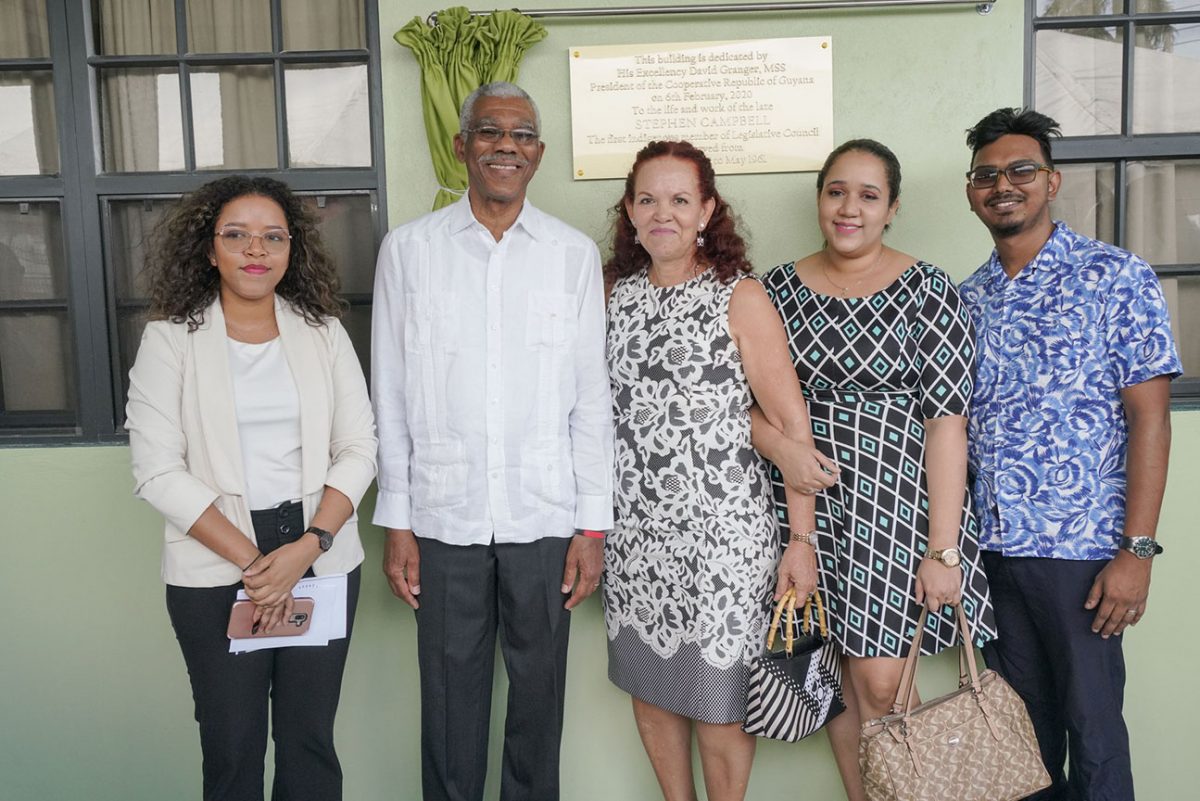President David Granger yesterday announced that the incumbent government is examining options for the introduction of a single national identification card which can be used for all government transactions.
Speaking at the commissioning ceremony of the Stephen Campbell House which houses the Ministry of the Presidency’s Department of Citizenship at Shiv Chanderpaul Drive, Granger explained that the proposed card will include biometric and security features.
“The establishment of the Department of Citizenship was intended to protect the rights of citizenship. Our citizenship policy is to ensure that every Guyanese citizen will be accounted for from birth to death, as far as technologically possible,” he said.
According to the president, who is performing the functions of a caretaker pending general elections on March 2, proof of nationality including a national identification card and passport allows for citizens to access education and to receive social assistance and public pensions.
“This single national identification card will replace the multiple forms of identification which are used presently by citizens,” he stressed, adding that it will be able to be used for transactions including receipt of NIS pensions, payment of taxes, social security, immigration and admission to schools.
Additionally government has been working to decentralize the issuance of passports and relieve the burdens which many citizens, across Guyana, had to face in travelling long distances and at great expense in order to obtain a passport.
Passport offices have now been established at the capital towns of New Amsterdam, East Berbice-Corentyne and Linden, Upper Demerara-Berbice, and another will soon be established in the Pomeroon-Supenaam area, at Anna Regina.
The intention is to have a passport office in every capital town so as to make the service more accessible to citizens.
Noting that the establishment of the Department was a positive and deliberate act of state policy, Granger said that the Department exemplified the importance which the Government attaches to protecting Guyanese citizenship and to preventing abuses which have been occurring with increasing frequency in other parts of the hemisphere.
“Citizenship of a state is a precious asset and must be managed carefully,” he stressed while adding that the wisdom of establishing the Department has now become evident as the country would have been unprepared for the present migrant challenges had the Department not been in place.
The president further explained that while the department is responding to the migrant challenges the more than 13,000 migrants from the Bolivarian Republic of Venezuela who have entered Guyana’s territory are placing a strain on social services, particularly the public health and public security systems.
In response the Department has adopted international best practices and is improving its management by strengthening its capacity to monitor and map these migrants.
It is seeking international help in providing them with humanitarian assistance, he noted while adding that Guyana’s extensive and often porous land borders increase the likelihood of illegal migration and emigration, including back-tracking.
“Guyana is a friendly country with hospitable people, but we must be able to discern between legal and illegal aliens. The work of the Department of Citizenship enables this to happen,” Granger said.
The President also noted that the Department of Citizenship, deservedly, now has its own building which was renovated in order to provide a comfortable and people- friendly environment for the work of the protecting local citizenship.
The building named after Guyana’s first Indigenous parliamentarian, Stephen Campbell will, Granger said stand as a testimonial of the nation’s commitment to protecting the right of every citizen regardless of race, religion or region of residence in accordance with the Constitution.
He said that Campbell was an ardent advocate of protecting Indigenous citizenship.
“He is best remembered for his sterling agitation for the protection of Indigenous peoples’ rights – rights which he felt were derived from their citizenship of this country,” Granger said adding that the decision by the British Guiana Independence Conference to acknowledge in 1965 Indigenous peoples rights to the legal ownership and occupancy over areas and reservations where they normally reside was greatly influenced by Stephen Campbell’s tireless and persistent agitation.
The Guyana Constitu-tion 1966 enshrined the protections for which Campbell had petitioned.






